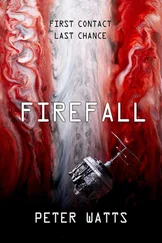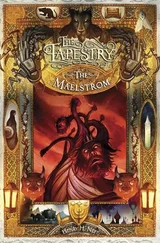Yet only a few had resisted. Perhaps they'd been conditioned by all the quarantines and blackouts, all the invisible boundaries CSIRA erected on a moment's notice. The rules changed from one second to the next, the rug could get pulled out just because the wind blew some exotic weed outside its acceptable home range. You couldn't fight something like that, you couldn't fight the wind. All you could do was adapt. People were evolving into herd animals.
Or maybe just accepting that that's what they'd always been.
Not Lenie Clarke, though. Somehow, she'd gone the other way. A born victim, passive and yielding as seaweed, had suddenly grown thorns and hardened its stems to steel. Lenie Clarke was a mutant; the same environment that turned everyone else into bobbing corks had transformed her into barbed wire.
A white diamond blossomed near Madison and La Salle. "Got her," the comlink crackled in a voice Lubin didn't recognize. "Probably her, anyway."
He tapped into the channel. "Probably?"
"Securicam snapshot down in a basement mall. No EM sensor down there, so we can't confirm. We got a three-quarter profile for a half-second, though. Bayesians say eighty-two percent likely."
"Can you seal off that block?"
"Not automatically. No master kill switches or anything."
"Okay, do it manually."
"Got it."
Lubin switched channels. "Engineering?"
"Here." They'd set up a dedicated line to City Planning. The people on that end were strictly need-to-know, of course; no hint of the stakes involved, no recognizable name to humanize the target. A dangerous fugitive in the core, yours is not to question why, full stop. Almost no chance for messy security breaches there.
"Have you got the fix on La Salle?" Lubin asked, zooming the chessboard.
"Sure do."
"What's down there?"
"These days, not much. Originally retail, but most of the merchants moved out with the spread. A lot of empty stalls."
"No, I mean substructures. Crawlspaces, service tunnels, that sort of thing. Why aren't I seeing any of that on the map?"
"Oh, shit, that stuff's ancient . TwenCen and older. A lot of it never even got into the database; by the time we updated our files nobody was using those areas except derelicts and wireheads, and with all the data-corruption problems we've been having—"
"You don't know ?" A soft beeping began in Lubin's head: someone else wanting to talk.
"Someone might have scanned the old blueprints onto a crystal somewhere. I could check."
"Do that." Lubin switched channels. "Lubin."
It was his point man on the seawall. "We're losing the tanglefoam."
"Already?" They should have had at least another hour.
"It's not just the rainfall, it's the storm sewers. They're funneling precip from the whole city right out through the seawall. Have you seen the volume those drains are putting out?"
"Not recently." Things just kept getting better.
Burton, unrebukably occupied with his own duties, nonetheless seemed to have an ear cocked in Lubin's direction. "I'll be right out," Lubin said after a moment.
"That's okay," Seawall said. "I can just feed you a—"
Lubin killed the channel.
* * *
Whitewater roared from a mouth in the revetment, wide as a tanker truck. Lubin couldn't begin to guess at the force of that discharge; it extended at least four meters from the wall before gravity could even coax it off the horizontal. The tanglefoam had retreated on all sides; Lake Michigan heaved and thrashed in the opened space, reclaiming even more territory.
Great.
There were eleven drains just like this along the secured waterfront. Lubin redeployed two dozen inshore personnel to the seawall.
City Planning beeped in his ear. "…nd some…"
He cranked up the filters on his headset; the roar of the storm faded a bit. "Say again?"
"Found something! Two-d and low-res, but it looks like there's nothing down there but a service crawlway running above the ceiling and a sewer main under the floor."
"Can they be accessed?" Even with the filters, Lubin could barely hear his own voice.
Engineering didn't seem to have any trouble, though. "Not from the concourse, of course. There's a physical plant under the next block."
"And if she got into the main?"
"She'd end up at the treatment plant on Burnham, most likely."
They had Burnham covered. But—"What do you mean, most likely ? Where else could she end up?"
"Sewage and storm systems spill together when things get really swamped. Keeps the treatment facilities from flooding. It's not as bad as it sounds, though. By the time things get this crazy, the flow's great enough to dilute the sewage—"
"Are you saying—" A bolt of lightning cut the sky into jagged fragments. Lubin forced himself to wait. The thunderclap in the ensuing darkness was deafening. "Are you saying she could be in the storm sewers? "
"Well, theoretically, but it doesn't matter."
"Why not?"
"There'd have to be an awful lot of water going through before the systems would mix. The moment your fugitive crossed over she'd be sucked down and drowned. No way she could fight the current, and there wouldn't be any airspace left in the pi—"
"Everything's going through the storm system now?"
"Most of it."
"Will the grates hold?"
"I don't understand," Engineering said.
"The grates! The grills covering the outfalls! Are they rated to withstand this kind of flow?"
"The grates are down," Engineering said.
" What! "
"They fold down automatically when tonnes-per-sec gets too high. Otherwise they'd impede flow and the whole system would back up."
Heavy metal strikes again.
Lubin opened an op-wide channel. "She's not coming overland. She's—"
Kinsman, the dolphin woman, cut in: "Gandhi's got something. Channel twelve."
He switched channels, found himself underwater. Half the image was a wash of static, interference even the Bayesians couldn't clear in realtime. The other half wasn't much better: a foamy gray wash of bubbles and turbulence.
A split-second glimpse, off to the left: a flicker of darker motion. Gandhi caught it too, twisted effortlessly into the new heading. The camera rotated smoothly around its own center of focus as the dolphin rolled over on its back. The murk darkened.
He's going deep , Lubin realized. Coming up from underneath. Good boy.
Now the image centered on a patch of diffuse radial brightness, fading to black on all sides: the optics of ascent toward a brighter surface. Suddenly the target was there , dead to rights: silhouetted arms, a head, flashing stage left and disappearing.
"Hit," Kinsman reported. "She never saw it coming."
"Remember, we don't want her bleeding out there," Lubin cautioned.
"Gandhi knows the drill. He's not using his pecs, he's just ram—"
Again: a piecemeal human shadow, found and lost in an instant. The image jarred slightly.
"Huh," Kinsman said. "She saw that coming somehow. Almost got out of the way in time."
The implants . For an instant Lubin was back on the Juan de Fuca Ridge, comfortably suspended under three kilometers of black icewater. Feeling Beebe's sonar tick-tick-tick ing against the machinery in his chest…
"She can feel the click trains," he said. "Tell Gandhi to lay—"
Another pass. This time the target faced her attacker head-on, eyes bright smudges in a dark jigsaw, one arm coming up in a vain attempt to ward off two hundred kilograms of bone and muscle wait a second she's holding something she's—
The image skidded to the left. Suddenly the water was spinning again, no smooth controlled rotation this time, just a wild slewing corkscrew, purely ballistic, slowing against ambient drag. The darkness of deep water swelled ahead. A different darkness spilled in from the side, a black gory cloud spreading into brief cumulus before the currents tore it apart.
Читать дальше









